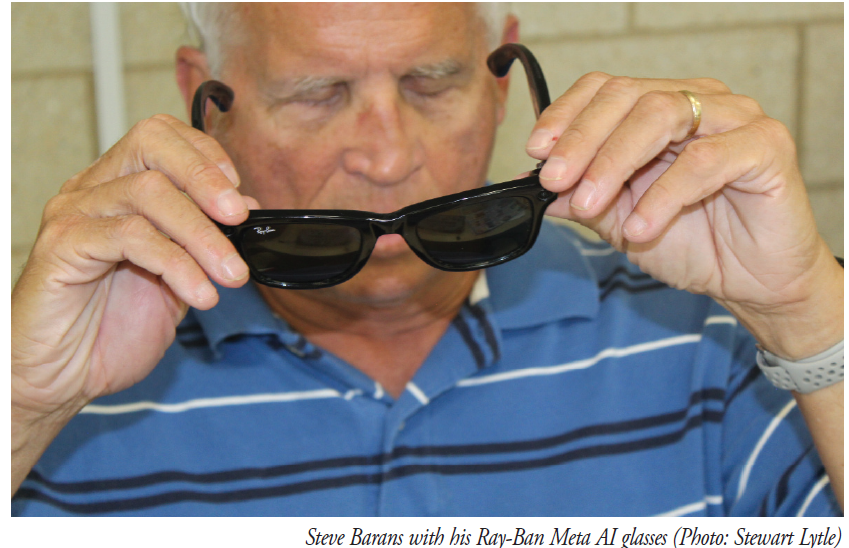REGIONAL – When Steve Baran came to lunch recently to talk about the Lions Club Clipper City Rail Trail project for low vision people, he who has been blind from birth picked up the menu and started to select his choice.
Am I being scammed? this writer thought.
Baran wore dark glasses and relied on his wife, Denise, to help him find a seat. So, “how is he reading the menu?” I asked.
“I am wearing Ray-Ban Meta smart glasses,” he announced proudly.
One of several smart eyewear on the market, the Ray-Ban Meta AI was designed for gamers and sighted people who find enjoy the hands-free technology the glasses offer. Compared to using their phones, the glasses are faster and less cumbersome.
But for the blind, these glasses, powered by artificial intelligence, are life changing. Baran, who helps lead low vision groups at Amesbury and Newburyport senior centers, demonstrated the glasses for the Amesbury group this month.
The new glasses on a voice command can make calls, send texts and find answers.
“These are pretty amazing,” Baran told the Amesbury group. “Are they perfect? No. Do I like them? Yes. Do they make a difference? Yes.”
And the cost is around $300 a pair, although some smart glasses are priced much higher. And the Ray Bans come in a wide variety of styles from the classic Aviator to the Wayfarer and Skylar. They also come with clear lenses.
Another brand that is receiving excellent reviews is the Vital Smart Glasses, which offers the same features as the Ray Bans, but it also will translate in 134 languages. The Ray Bans will translate in French, Italian and Spanish.
At his Amesbury presentation, Baran brought a Market Basket newspaper insert. He turned the glasses on and said, “Hey, Meta,” he said. “Read this.”
The glasses use an ultra-wide, 12-metapixel camera to register what is in front of it. It can produce both images and videos. The improved cameras record 1080p videos of up to 60 seconds, which can be shared with contacts using voice command.
The glasses, which run on a charge of about four hours and can be charged in the case, talk to the wearer from speakers in the arm behind the left ear. It is almost impossible for others to hear.
After two months of wearing his smart glasses, Baran admits he is still learning what the glasses can do and how to hold his head to allow the camera to read what is front of him. As a blind person, that has not been necessary.
In the growing smart glasses competition among manufacturers, Baran expects that more technology enhancements will be coming soon.
Asked what the glasses will not do, Barans said it will not let him cross the street without assistance. But it will read to him the words on a sign.
That brought us back to the interview I originally conducted over lunch.
In a project spearheaded by Baran, the Lions Club is installing beacons on mile posts along the rail trail in Newburyport. As reported in The Town Common two weeks ago, the beacons will talk with a free app on a cell phone and act as a guide on the trail, help walkers with directions and keep them informed of what they are about to encounter on the trail.
The Lions Club is testing the beacons now and expects to have it fully functional in the next few weeks. ♦




